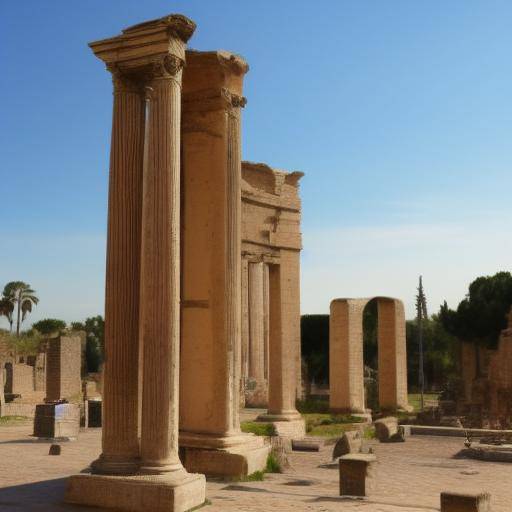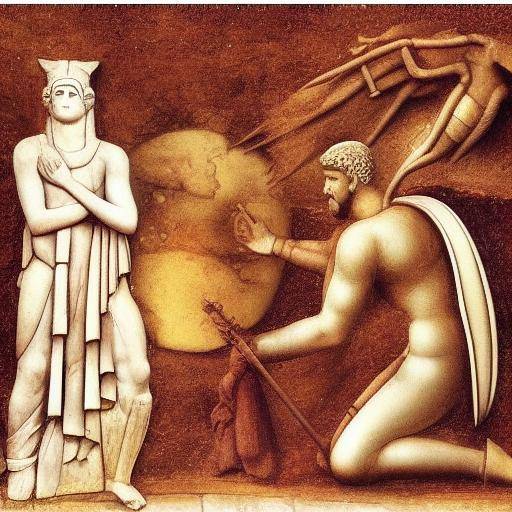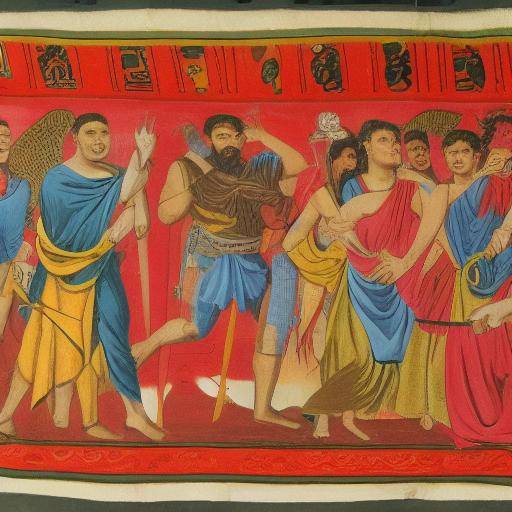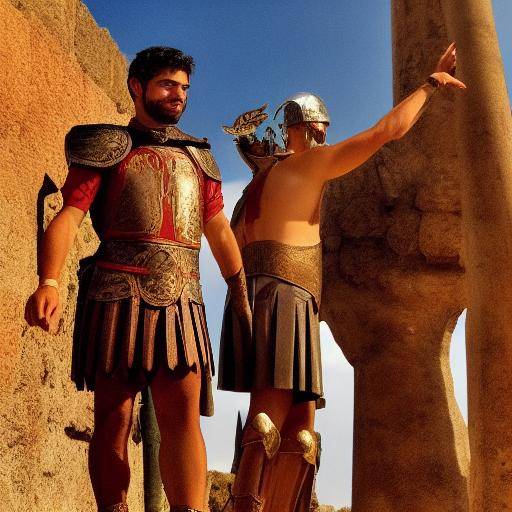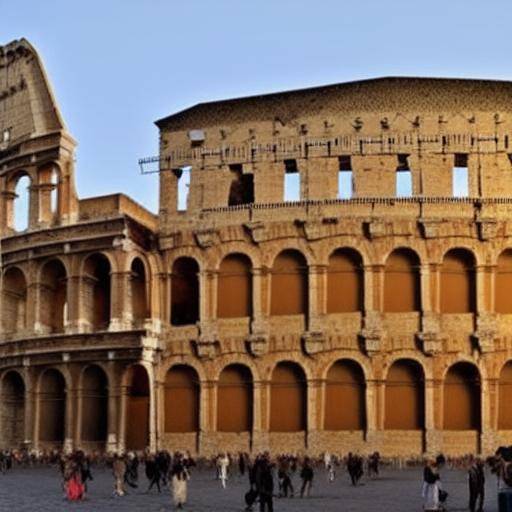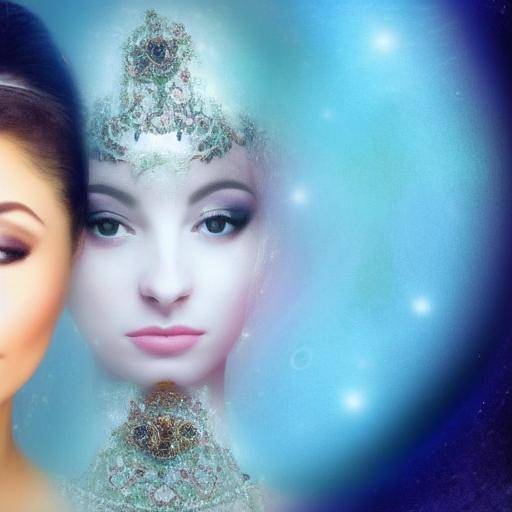
Roman history is full of mythological figures. Among them, Venus stands out as one of the most emblematic deities, being the representation of love, beauty and fertility in ancient Roman mythology. In this article, we will explore the myths that surround Venus, its relationship with Roman mythology and its role as the goddess of love.
Introduction
The stories of gods and goddess in Roman mythology have transcended time, influencing aspects of culture, art and literature in contemporary society. In the midst of all these figures, Venus emerges as one of the most enigmatic and venerated deities. In this article, we will immerse ourselves in his myths, explore his relationship with Roman mythology and unravel his role as the goddess of love and beauty.
History and Background
Venus, known as the goddess of love, is one of the most venerated divinities in Roman mythology. Its origin dates back to the Greek mythology, where it was known as Afrodita. However, as the influence of Greek culture expanded to ancient Rome, Aphrodite became Venus, adopting its own attributes and roles, thus enriching Roman mythology.
Origin and Myths
Venus is born from the sea foam, according to legend, an event that symbolizes its connection with natural beauty and love. This image has been immortalized in numerous works of art, such as "The Birth of Venus" by Botticelli.
Rol in Roman Mythology
His role as a goddess of love and beauty transcended the walls of the temples and intertwined with the daily life of the Romans. The veneration of Venus was manifested through rituals, festivals and works of art that exalted its beauty and divinity. Its influence spread from the spheres of love and fertility to war and agriculture, consolidating its position as one of the dominant figures in the Roman pantheon.
Deep analysis
Venus and Roman Mythology
The role of Venus in Roman mythology was multifaceted. The legends and myths that wrapped it reflected the complexity of their attributes, from their relationship with other Roman gods to their interventions in the life of mortals. His influence was not only limited to love and beauty, but extended to fertility, prosperity and victory in the battlefield.
The myth of Venus and Mars, the god of war, illustrates his connection to the war sphere. His relationship with the heroic Anquises and the subsequent birth of Eneas, considered the mythical ancestor of Rómulo and Remo, founders of Rome, highlights his role in the foundation and destiny of the city.
Meaning of Venus as Goddess of Love
As a goddess of love, Venus exerted a profound influence on Roman life. The Romans venerated their power to foster passionate and lasting relationships, and their associated rituals and festivals not only celebrated love among couples, but also encompassed fertility, sexuality and harmony in society.
The influence of Venus as a goddess of love spread through everyday acts, such as the choice of the wedding day and the realization of offerings during the holidays dedicated to the goddess. Even in the artistic sphere, his representation in paintings, sculptures and literary pieces conveyed the idealized beauty and love as a transcendent force.
Venus in the News
Despite the centuries passed, the influence of Venus persists in contemporary culture. His representation in art, music and literature continues to inspire artists and creators. Likewise, the concept of Veusian love remains the subject of study in fields such as psychology and sociology, feeding discussions about the nature of love and its impact on human relations.
Symbolism associated with Venus has also transcended the limits of mythology, permeating the sphere of marketing and fashion, where its name evokes images of beauty, sensuality and elegance. Companies use their image and name to promote products related to beauty and personal care, capitalizing on the association with the goddess of love and beauty.
Comparative analysis
Venus and Aphrodite
Venus in Roman mythology stands out for its singularity, but at the same time its influence and attributes intertwine with goddess from other cultures, such as the Greek goddess Aphrodite. The comparative analysis between both deities reveals similarities in their role as goddess of love and beauty, as well as in their respective myths and legends that transcend geographical and temporal borders.
Connections with Other Deities
The figure of Venus also relates to goddess of other cultures, such as Freyja in the Nordic mythology or Ishtar in Mesopotamian mythology, showing connections between different mythological traditions.
Practical Tips and Modern Applications
How can the myth of Venus and its role as a goddess of love influence our modern lives? The principles that Venus embodies can provide valuable insights for individuals in search of understanding and balance in their relationships and in their appreciation of beauty. Some practical tips based on Venus' influence could include:
- Cultivate relationships based on respect, passion and proper communication.
- Recognize and appreciate beauty in all its forms, both in the world around us and in ourselves.
- Celebrate love and sexuality as natural and significant aspects of human experience, without taboos or stigmas.
Conclusions and FAQs
Conclusions
The figure of Venus, as a goddess of love and beauty in Roman mythology, transcends time and continues to exert a lasting influence on current culture and society. Their representation in Roman mythology and their role as a deity of love offer a rich ground for reflection on the meaning of love, beauty and fertility in our lives.
Frequently asked questions
- What is the best known myth associated with Venus?
- One of the best known myths is the birth of Eneas, the son of Venus and Anquises, whose offspring is linked to the mythical foundation of Rome.
- What is the influence of Venus in art?
- The representation of Venus has been a source of inspiration for artists throughout history, becoming a symbol of idealized beauty and transcendental love.
- How was the festival dedicated to Venus celebrated in ancient Rome?
- The festival of Venus, known as "Veneralia", was celebrated on April 1st and was an occasion to honor the goddess through rituals and offerings, especially in the context of love and fertility.
- How does Venus compare to the aphrodite goddess of Greek mythology?
- Venus and Aphrodite share similarities in their role as goddess of love and beauty, whose myths and symbolisms show cultural parallels between Roman and Greek mythology.
- Why is Venus considered a relevant figure in Roman mythology?
- The influence of Venus transcends many aspects of Roman life, ranging from love and fertility to war and prosperity, strengthening its relevance in Roman mythology.
- What is the impact of Venus on contemporary society?
- The influence of Venus persists in the current culture through its representation in art, music, fashion and symbolism associated with love and beauty.
In short, Venus, the goddess of love and beauty in Roman mythology, offers a rich source of knowledge and reflection. His legacy transcends time, providing valuable lessons on love, beauty and fertility, as well as influencing significant aspects of everyday life and contemporary culture. This article has explored its history, meaning and relevance, providing a profound and unique perspective on the legendary Roman deity.
By understanding and appreciating the influence of Venus in a wider cultural and social context, we can appreciate more deeply the complexities of love and beauty in our humanity.



